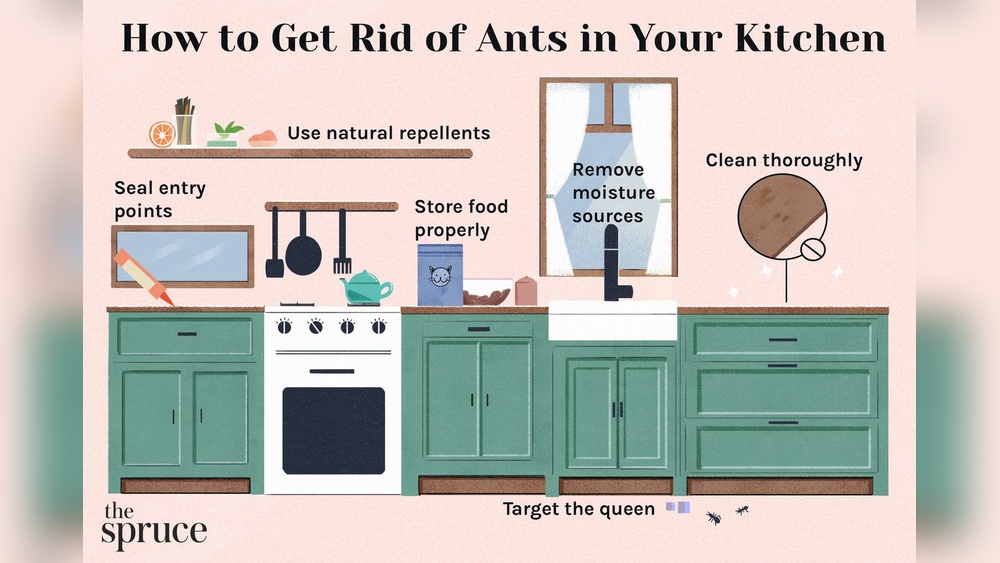Are ants marching across your kitchen counters again? You’re not alone—and it’s more than just a nuisance.
These tiny invaders can spoil your food, contaminate surfaces, and make your kitchen feel less like a safe space. But don’t worry, you don’t have to live with them. By understanding why ants keep showing up and taking simple, effective steps, you can reclaim your kitchen quickly.
Keep reading to discover easy ways to stop ants in their tracks and keep your kitchen ant-free for good.
:max_bytes(150000):strip_icc()/TheSpruce_Howtogetridofandpreventodoroushouseants_colorv1-d55f1b3ffb8f44e1a34ba6d0a07bd4a0.png)
Reasons Ants Invade Kitchens
Ants come to kitchens mainly for food and water. They love sweet or sticky spills and any uncovered snacks. Even pet food left out can attract them. Moisture also plays a big role. Leaky pipes and damp sponges give ants the water they need.
Ants find their way inside through tiny cracks and openings in walls, doors, or windows. Once inside, they leave scent trails made of chemicals. These trails guide other ants straight to the food source. Following these trails helps ants reach your kitchen quickly.

Immediate Cleanup Steps
Wipe spills and crumbs right away to stop ants from finding food. Use a damp cloth or paper towel to clean all kitchen surfaces, including counters, tables, and floors. Pay close attention to sticky spots or sugary spills, as ants love these.
Store food in sealed containers to keep ants out. Use plastic or glass jars with tight lids for snacks, cereals, and pet food. This prevents ants from smelling and reaching the food.
Take out the trash regularly. Trash bins often attract ants because of leftover food scraps. Use a bin with a lid and empty it daily to reduce odors and stop ants from invading your kitchen.
Eliminating Moisture
Fixing leaky pipes and faucets is essential to stop ants. Water leaks create wet spots that attract ants searching for moisture. Even small drips under the sink or near the fridge can be a problem. Make sure to check all pipes carefully. Tighten loose connections and replace worn-out washers. If needed, call a plumber to fix stubborn leaks.
Drying damp areas helps remove the moisture ants need to survive. Use a towel or cloth to soak up water around sinks, counters, and floors. Keep sponges and dishcloths dry by hanging them after use. Use a fan or open windows to help air circulate and dry the kitchen faster. A dry kitchen is less inviting for ants.
Tracking Ant Trails
Ants leave a visible trail that helps locate their paths. These trails usually lead from food sources to their nests. Watching ants closely reveals entry points like cracks or gaps in walls, windows, or doors.
Finding nests is easier by tracking these trails back to hidden spots. Common nest places include inside walls, under sinks, or behind appliances. Sealing these entry points stops more ants from coming inside.
| Task | Details |
|---|---|
| Follow Ant Trails | Observe ants moving in lines to find their path |
| Locate Entry Points | Check for cracks, door gaps, or window spaces |
| Find Nests | Look behind appliances, under sinks, or inside walls |
| Seal Openings | Use caulk or tape to block ant entry |
Sealing Entry Points
Common areas where ants enter include cracks around windows, doors, and baseboards. Check places where pipes or wires enter the kitchen walls. Small gaps in cabinets or floors are entry spots too. Use caulk and sealants to close these openings tightly. This stops ants from getting inside.
Apply caulk along cracks or holes, then smooth it out. Let it dry fully before touching. Use sealants around sinks and drains to block hidden paths. Check for any gaps under appliances or behind cupboards. Seal those spots well to keep ants out.
Natural Ant Deterrents
Mix equal parts of white vinegar and water in a spray bottle. Spray this solution on ant trails, entry points, and kitchen surfaces. Vinegar disrupts the ants’ scent trails, making it hard for them to find food. Repeat spraying daily until ants disappear.
Use peppermint oil as a natural ant repellent. Add 10-15 drops of peppermint oil to water in a spray bottle. Spray around windows, doors, and cabinets where ants enter. The strong peppermint smell masks their scent trails and keeps ants away. Cotton balls dipped in peppermint oil can also be placed near entry points for added effect.
Ant Baits And Chemical Options
Ant baits contain a small amount of poison mixed with a food attractant. Ants carry the bait back to their colony. The poison then spreads to other ants, killing many inside the nest. This method targets the whole colony, not just the ants you see.
Place baits where ants are active but away from children and pets. Avoid putting baits near food preparation areas. Keep baits in corners, behind appliances, or under sinks. Do not spray insecticides near baits as it can stop ants from eating them.
When To Seek Professional Help
Signs of a persistent ant infestation include seeing ants daily, finding many trails, and discovering nests inside walls or cabinets. Small sprays and baits may not work well anymore. Ants keep coming back despite cleaning and home remedies.
Choosing a pest control service means picking a company with good reviews and proper licenses. They use safe and effective methods to remove ants and stop them from returning. Ask about their treatment plans, costs, and guarantees before hiring.
| Signs of Persistent Infestation | Choosing a Pest Control Service |
|---|---|
|
|

Frequently Asked Questions
Why Have I Suddenly Got Ants In My Kitchen?
Ants invade kitchens seeking food, water, or shelter. Spills, uncovered food, and leaks attract them. Seal entry points and clean thoroughly to prevent infestation.
How Do You Get Rid Of Ants Permanently?
Clean thoroughly, store food sealed, fix leaks, seal entry points, and use ant baits. Repeat to eliminate colonies permanently.
How Long Will Vinegar Keep Ants Away?
Vinegar keeps ants away for a few hours by disrupting their scent trails. Reapply every few hours for continued effect.
What Smell Do Ants Hate?
Ants hate strong smells like peppermint, vinegar, lemon, cinnamon, and eucalyptus. These scents disrupt their trails and repel them effectively.
Conclusion
Getting rid of ants in your kitchen needs quick action and simple steps. Clean all spills and store food properly. Fix leaks and remove moisture to stop ants from coming. Find their entry points and seal them tightly. Use natural sprays like vinegar or peppermint oil to confuse ants.
Set ant baits to kill the entire colony safely. Keep your kitchen clean every day to prevent ants from returning. Small efforts can make a big difference in keeping ants away for good.

Yes, working as , Food Blogger and Product Reviewer for last 6 years. Here you will get amazing deals for Smart kitchen products. I am your best source for the latest update in cooking trends. I provide insightful articles, reviews, and analysis on cutting-edge kitchen gadget. My mission is to empower readers with the knowledge they need to stay ahead in a rapidly evolving coking world. Join me as we explore the future of food technology and how it shapes our lives today and tomorrow.





